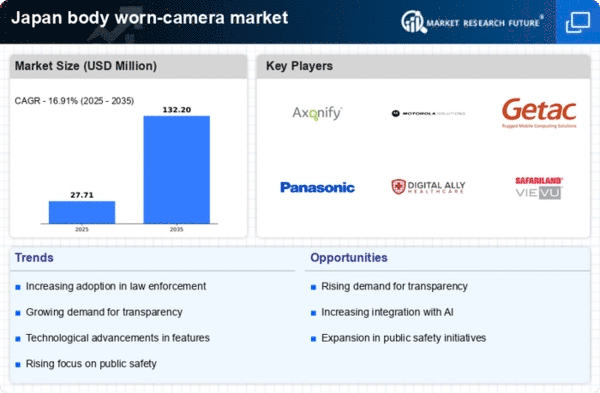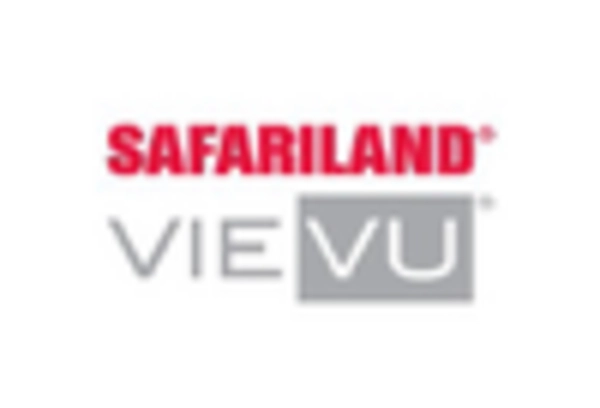The body worn-camera market in Japan is characterized by a dynamic competitive landscape, driven by technological advancements and increasing demand for accountability in law enforcement and security sectors. Key players such as Axon (US), Panasonic (JP), and Motorola Solutions (US) are at the forefront, each adopting distinct strategies to enhance their market presence. Axon (US) focuses on innovation through continuous product development, emphasizing integrated software solutions that complement their hardware offerings. Meanwhile, Panasonic (JP) leverages its strong brand reputation and extensive distribution network to penetrate various sectors, including public safety and private security. Motorola Solutions (US) appears to be concentrating on strategic partnerships to expand its service offerings, particularly in the realm of cloud-based solutions for data management and analysis, which is increasingly vital in the current market environment.
The business tactics employed by these companies reflect a trend towards localizing manufacturing and optimizing supply chains to enhance operational efficiency. The market structure is moderately fragmented, with several players vying for market share, yet the collective influence of major companies like Axon (US) and Panasonic (JP) shapes competitive dynamics significantly. This fragmentation allows for niche players to emerge, yet the dominance of established firms ensures a competitive atmosphere where innovation and quality are paramount.
In October 2025, Axon (US) announced a partnership with a leading AI technology firm to enhance its body worn-camera analytics capabilities. This strategic move is likely to bolster Axon's position in the market by providing law enforcement agencies with advanced tools for real-time data analysis, thereby improving operational efficiency and accountability. The integration of AI into their product offerings may also set a new standard for performance in the industry.
In September 2025, Panasonic (JP) launched a new line of rugged body worn-cameras designed specifically for extreme environments, targeting sectors such as emergency services and military applications. This product launch not only showcases Panasonic's commitment to innovation but also reflects a strategic pivot towards specialized markets, potentially increasing its market share in high-demand segments. The emphasis on durability and functionality aligns with current trends in public safety equipment.
In August 2025, Motorola Solutions (US) expanded its cloud-based services for body worn-camera data management, enhancing its existing portfolio. This expansion is indicative of a broader trend towards digital transformation within the industry, as agencies increasingly seek integrated solutions that streamline operations and improve data accessibility. By focusing on cloud services, Motorola Solutions (US) positions itself as a leader in the evolving landscape of digital law enforcement tools.
As of November 2025, the competitive trends in the body worn-camera market are heavily influenced by digitalization, sustainability, and the integration of AI technologies. Strategic alliances are becoming increasingly important, as companies recognize the need to collaborate to enhance their technological capabilities and market reach. The shift from price-based competition to a focus on innovation, technology, and supply chain reliability is evident, suggesting that future competitive differentiation will hinge on the ability to deliver advanced, reliable solutions that meet the evolving needs of users.

















